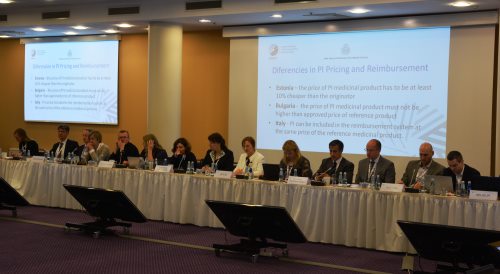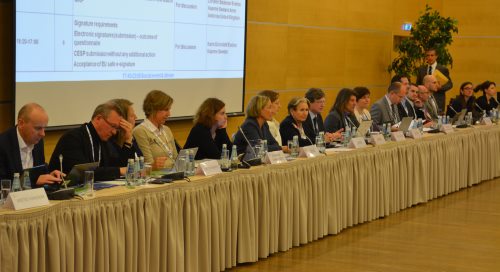Lawyers and marketing authorisation experts of European medicines agencies discuss current pharmaceutical issues in Riga
| | Lawyers and marketing authorisation experts of European medicines agencies discuss current pharmaceutical issues in Riga On 6-7 May the meeting of the European Medicines Agencies Group on the Cooperation on Legal and Legislative Issues (EMACOLEX) took place in Riga. This informal working party provides legal advice within the European medicines regulatory framework and the network of regulatory authorities. The informal meeting of the Co-ordination Group for Mutual Recognition and Decentralised Procedures – human (CMDh) also took place with an aim to discuss issues related to the marketing authorisation of medicines in two or more EU Member States via mutual recognition or decentralised procedures. The meeting in Riga brought together almost 100 participants – leading marketing authorisation experts and lawyers from medicines agencies in the EU Member States and EEA countries. On 6-7 May the meeting of the European Medicines Agencies Group on the Cooperation on Legal and Legislative Issues (EMACOLEX) took place in Riga. This informal working party provides legal advice within the European medicines regulatory framework and the network of regulatory authorities. The informal meeting of the Co-ordination Group for Mutual Recognition and Decentralised Procedures – human (CMDh) also took place with an aim to discuss issues related to the marketing authorisation of medicines in two or more EU Member States via mutual recognition or decentralised procedures. The meeting in Riga brought together almost 100 participants – leading marketing authorisation experts and lawyers from medicines agencies in the EU Member States and EEA countries.
 Do patients throughout Europe have equal possibilities to receive good quality and effective medicines? What is the role of the Member States’ regulatory authorities in the availability of new and innovative medicines for the patients? Is it in the power of these authorities to promote greater options in the choice of medicines for the patients and to improve the availability of medicines? Marketing authorisation experts from all over Europe were seeking answers to these questions and more during the meeting in Riga. Do patients throughout Europe have equal possibilities to receive good quality and effective medicines? What is the role of the Member States’ regulatory authorities in the availability of new and innovative medicines for the patients? Is it in the power of these authorities to promote greater options in the choice of medicines for the patients and to improve the availability of medicines? Marketing authorisation experts from all over Europe were seeking answers to these questions and more during the meeting in Riga.
The most important issues discussed during the meeting in Riga were as follows: - A co-operation model between the working group of marketing authorisation experts and the working group on legal issues in order to promote harmonised understanding of the legal aspects in the regulation of medicines among experts at Member State level;
- Analysis of the rulings of the European Court of Justice in the pharmaceutics;
- Issues regarding parallel import of medicines in Europe – even though the purpose of parallel import is to ensure better availability of medicines for the patients, experience of the Member States shows that the parallel imported medicines are not always cheaper. The risks for patients were also indicated – parallel imported medicines have less effective pharmacovigilance measures in place, mistakes in the re-packaging process are possible, etc. Before issuance of authorisation for parallel import of medicines, assessment of the authorisation application is carried out in the Member States by experts from national medicines agencies. The fee for the issuance of the authorisation for parallel import varies throughout Europe from 250 euros to 2500 euros and more;
- Marketing authorisation issues in situations when medicines are being authorised in several Member States at the same time, and it is necessary to approve summary of product characteristics and package leaflets, and other documents in several languages.
As part of the Latvian Presidency of the EU Council, the Latvian State Agency of Medicines hosted this meeting and is organising seven different level meetings for working groups of European experts, including the meetings of the Heads of Medicines Agencies (HMA), Competent Authorities for Medical Devices (CAMD), HMA Working Group of Quality Managers (WGQM), Working Group of Communication Professionals and Clinical Trials Facilitation Group. Medicines have to be authorised in order to enter the EU market. The regulatory system in Europe includes the network of national agencies for human and veterinary medicines in the EU Member States and the EEA countries, as well as the European Commission (EC) and the European Medicines Agency. |